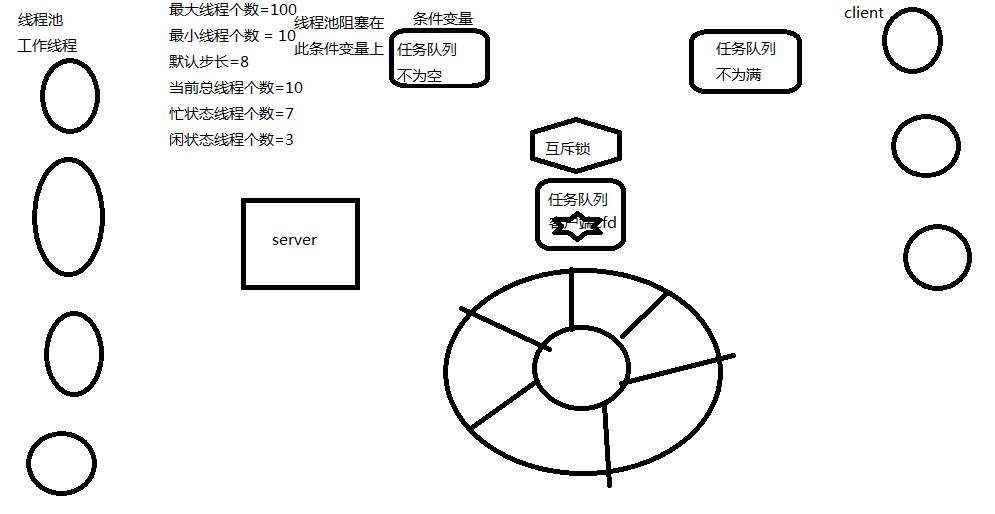
/*by wenpeng.xing@gmail.com*/
#include <stdlib.h>
#include <pthread.h>
#include <unistd.h>
#include <assert.h>
#include <stdio.h>
#include <string.h>
#include <signal.h>
#include <errno.h>
#include "threadpool.h"
#define DEFAULT_TIME 10 /*10s检测一次*/
#define MIN_WAIT_TASK_NUM 10 /*如果queue_size > MIN_WAIT_TASK_NUM 添加新的线程到线程池*/
#define DEFAULT_THREAD_VARY 10 /*每次创建和销毁线程的个数*/
#define true 1
#define false 0
typedef struct
{
void *(*function)(void *); /*函数指针,回调函数*/
void *arg; /*上面函数的参数*/
} threadpool_task_t; /*任务结构体*/
struct threadpool_t
{
pthread_mutex_t lock; /*用于锁住当前这个结构体体taskpoll*/
pthread_mutex_t thread_counter; /*记录忙状态线程个数*/
pthread_cond_t queue_not_full; /*当任务队列满时,添加任务的线程阻塞,等待此条件变量*/
pthread_cond_t queue_not_empty; /*任务队列里不为空时,通知等待任务的线程*/
pthread_t *threads; /*保存工作线程tid的数组*/
pthread_t adjust_tid; /*管理线程tid*/
threadpool_task_t *task_queue; /*任务队列*/
int min_thr_num; /*线程组内默认最小线程数*/
int max_thr_num; /*线程组内默认最大线程数*/
int live_thr_num; /*当前存活线程个数*/
int busy_thr_num; /*忙状态线程个数*/
int wait_exit_thr_num; /*要销毁的线程个数*/
int queue_front; /*队头索引下标*/
int queue_rear; /*队未索引下标*/
int queue_size; /*队中元素个数*/
int queue_max_size; /*队列中最大容纳个数*/
int shutdown; /*线程池使用状态,true或false*/
};
/**
* @function void *threadpool_thread(void *threadpool)
* @desc the worker thread
* @param threadpool the pool which own the thread
*/
void *threadpool_thread(void *threadpool);
/**
* @function void *adjust_thread(void *threadpool);
* @desc manager thread
* @param threadpool the threadpool
*/
void *adjust_thread(void *threadpool);
/**
* check a thread is alive
*/
int is_thread_alive(pthread_t tid);
int threadpool_free(threadpool_t *pool);
threadpool_t *threadpool_create(int min_thr_num, int max_thr_num, int queue_max_size)
{
int i;
threadpool_t *pool = NULL;
do{
if((pool = (threadpool_t *)malloc(sizeof(threadpool_t))) == NULL)
{
printf("malloc threadpool fail");
break; /*跳出do while*/
}
pool->min_thr_num = min_thr_num;
pool->max_thr_num = max_thr_num;
pool->busy_thr_num = 0;
pool->live_thr_num = min_thr_num;
pool->queue_size = 0;
pool->queue_max_size = queue_max_size;
pool->queue_front = 0;
pool->queue_rear = 0;
pool->shutdown = false;
pool->threads = (pthread_t *)malloc(sizeof(pthread_t)*max_thr_num);
if (pool->threads == NULL)
{
printf("malloc threads fail");
break;
}
memset(pool->threads, 0, sizeof(pool->threads));
pool->task_queue = (threadpool_task_t *)malloc(sizeof(threadpool_task_t)*queue_max_size);
if (pool->task_queue == NULL)
{
printf("malloc task_queue fail");
break;
}
if (pthread_mutex_init(&(pool->lock), NULL) != 0
|| pthread_mutex_init(&(pool->thread_counter), NULL) != 0
|| pthread_cond_init(&(pool->queue_not_empty), NULL) != 0
|| pthread_cond_init(&(pool->queue_not_full), NULL) != 0)
{
printf("init the lock or cond fail");
break;
}
/* 启动min_thr_num个work thread */
for (i = 0; i < min_thr_num; i++)
{
pthread_create(&(pool->threads[i]), NULL, threadpool_thread, (void *)pool);
printf("start thread 0x%x...\n", (unsigned int)pool->threads[i]);
}
pthread_create(&(pool->adjust_tid), NULL, adjust_thread, (void *)pool);
return pool;
}while(0);
threadpool_free(pool); /*前面代码调用失败时,释放poll存储空间*/
return NULL;
}
int threadpool_add(threadpool_t *pool, void*(*function)(void *arg), void *arg)
{
pthread_mutex_lock(&(pool->lock));
while ((pool->queue_size == pool->queue_max_size) && (!pool->shutdown))
{
pthread_cond_wait(&(pool->queue_not_full), &(pool->lock));
}
if (pool->shutdown)
{
pthread_mutex_unlock(&(pool->lock));
}
/*添加任务到任务队列里*/
if (pool->task_queue[pool->queue_rear].arg != NULL)
{
free(pool->task_queue[pool->queue_rear].arg);
pool->task_queue[pool->queue_rear].arg = NULL;
}
pool->task_queue[pool->queue_rear].function = function;
pool->task_queue[pool->queue_rear].arg = arg;
pool->queue_rear = (pool->queue_rear + 1)%pool->queue_max_size;
pool->queue_size++;
/*任务队列不为空,唤醒等待处理任务的线程*/
pthread_cond_signal(&(pool->queue_not_empty));
pthread_mutex_unlock(&(pool->lock));
return 0;
}
void *threadpool_thread(void *threadpool)
{
threadpool_t *pool = (threadpool_t *)threadpool;
threadpool_task_t task;
while(true)
{
/* Lock must be taken to wait on conditional variable */
/*刚创建出线程,等待任务队列里有任务,否则阻塞等待任务队列里有任务后再唤醒接收任务*/
pthread_mutex_lock(&(pool->lock));
while ((pool->queue_size == 0) && (!pool->shutdown))
{
printf("thread 0x%x is waiting\n", (unsigned int)pthread_self());
pthread_cond_wait(&(pool->queue_not_empty), &(pool->lock));
/*清除指定数目的空闲线程,如果要结束的线程个数大于0,结束线程*/
if (pool->wait_exit_thr_num > 0)
{
pool->wait_exit_thr_num--;
/*如果线程池里线程个数大于最小值时可以结束当前线程*/
if (pool->live_thr_num > pool->min_thr_num)
{
printf("thread 0x%x is exiting\n", (unsigned int)pthread_self());
pool->live_thr_num--;
pthread_mutex_unlock(&(pool->lock));
pthread_exit(NULL);
}
}
}
/*如果指定了true,要关闭线程池里的每个线程,自行退出处理*/
if (pool->shutdown)
{
pthread_mutex_unlock(&(pool->lock));
printf("thread 0x%x is exiting\n", (unsigned int)pthread_self());
pthread_exit(NULL);
}
/*从任务队列里获得任务*/
task.function = pool->task_queue[pool->queue_front].function;
task.arg = pool->task_queue[pool->queue_front].arg;
pool->queue_front = (pool->queue_front + 1)%pool->queue_max_size;
pool->queue_size--;
/*通知可以有新的任务添加进来*/
pthread_cond_broadcast(&(pool->queue_not_full));
pthread_mutex_unlock(&(pool->lock));
/*执行任务*/
printf("thread 0x%x start working\n", (unsigned int)pthread_self());
pthread_mutex_lock(&(pool->thread_counter));
pool->busy_thr_num++; /*忙状态线程数加1*/
pthread_mutex_unlock(&(pool->thread_counter));
(*(task.function))(task.arg); /*执行回调函数任务*/
//task.function(task.arg); /*执行回调函数任务*/
/*任务结束处理*/
printf("thread 0x%x end working\n", (unsigned int)pthread_self());
pthread_mutex_lock(&(pool->thread_counter));
pool->busy_thr_num--; /*忙状态数减1*/
pthread_mutex_unlock(&(pool->thread_counter));
}
pthread_exit(NULL);
//return (NULL);
}
void *adjust_thread(void *threadpool)
{
int i;
threadpool_t *pool = (threadpool_t *)threadpool;
while (!pool->shutdown)
{
sleep(DEFAULT_TIME); /*延时10秒*/
pthread_mutex_lock(&(pool->lock));
int queue_size = pool->queue_size;
int live_thr_num = pool->live_thr_num;
pthread_mutex_unlock(&(pool->lock));
pthread_mutex_lock(&(pool->thread_counter));
int busy_thr_num = pool->busy_thr_num;
pthread_mutex_unlock(&(pool->thread_counter));
/*任务数大于最小线程池个数并且存活的线程数少于最大线程个数时,创建新线程*/
if (queue_size >= MIN_WAIT_TASK_NUM && live_thr_num < pool->max_thr_num)
{
pthread_mutex_lock(&(pool->lock));
int add = 0;
/*一次增加DEFAULT_THREAD个线程*/
for (i = 0; i < pool->max_thr_num && add < DEFAULT_THREAD_VARY && pool->live_thr_num < pool->max_thr_num; i++)
{
if (pool->threads[i] == 0 || !is_thread_alive(pool->threads[i]))
{
pthread_create(&(pool->threads[i]), NULL, threadpool_thread, (void *)pool);
add++;
pool->live_thr_num++;
}
}
pthread_mutex_unlock(&(pool->lock));
}
/*销毁多余的空闲线程*/
if ((busy_thr_num * 2) < live_thr_num
&& live_thr_num > pool->min_thr_num)
{
/*一次销毁DEFAULT_THREAD个线程*/
pthread_mutex_lock(&(pool->lock));
pool->wait_exit_thr_num = DEFAULT_THREAD_VARY;
pthread_mutex_unlock(&(pool->lock));
for (i = 0; i < DEFAULT_THREAD_VARY; i++)
{
/*通知处在空闲状态的线程*/
pthread_cond_signal(&(pool->queue_not_empty));
}
}
}
}
int threadpool_destroy(threadpool_t *pool)
{
int i;
if (pool == NULL)
{
return -1;
}
pool->shutdown = true;
/*先销毁管理线程*/
pthread_join(pool->adjust_tid, NULL);
for (i = 0; i < pool->live_thr_num; i++)
{
/*通知所有的空闲线程*/
pthread_cond_broadcast(&(pool->queue_not_empty));
pthread_join(pool->threads[i], NULL);
}
threadpool_free(pool);
return 0;
}
int threadpool_free(threadpool_t *pool)
{
if (pool == NULL)
{
return -1;
}
if (pool->task_queue)
{
free(pool->task_queue);
}
if (pool->threads)
{
free(pool->threads);
pthread_mutex_lock(&(pool->lock));
pthread_mutex_destroy(&(pool->lock));
pthread_mutex_lock(&(pool->thread_counter));
pthread_mutex_destroy(&(pool->thread_counter));
pthread_cond_destroy(&(pool->queue_not_empty));
pthread_cond_destroy(&(pool->queue_not_full));
}
free(pool);
pool = NULL;
return 0;
}
int threadpool_all_threadnum(threadpool_t *pool)
{
int all_threadnum = -1;
pthread_mutex_lock(&(pool->lock));
all_threadnum = pool->live_thr_num;
pthread_mutex_unlock(&(pool->lock));
return all_threadnum;
}
int threadpool_busy_threadnum(threadpool_t *pool)
{
int busy_threadnum = -1;
pthread_mutex_lock(&(pool->thread_counter));
busy_threadnum = pool->busy_thr_num;
pthread_mutex_unlock(&(pool->thread_counter));
return busy_threadnum;
}
int is_thread_alive(pthread_t tid)
{
int kill_rc = pthread_kill(tid, 0);
if (kill_rc == ESRCH)
{
return false;
}
return true;
}
/*测试使用,作成库时请注释掉下面代码*/
#if 1
void *process(void *arg)
{
printf("thread 0x%x working on task %d\n ",(unsigned int)pthread_self(),*(int *)arg);
sleep(1);
printf("task %d is end\n",*(int *)arg);
return NULL;
}
int main(void)
{
threadpool_t *thp = threadpool_create(3,100,100); /*线程池里最小3个线程,最大100个,队列最大值12*/
printf("pool inited");
int *num = (int *)malloc(sizeof(int)*20);
//int num[20];
int i;
for (i=0;i<10;i++)
{
num[i]=i;
printf("add task %d\n",i);
threadpool_add(thp,process,(void*)&num[i]);
}
sleep(10);
threadpool_destroy(thp);
}
#endif
#ifndef __THREADPOOL_H_
#define __THREADPOOL_H_
typedef struct threadpool_t threadpool_t;
/**
* @function threadpool_create
* @descCreates a threadpool_t object.
* @param thr_num thread num
* @param max_thr_num max thread size
* @param queue_max_size size of the queue.
* @return a newly created thread pool or NULL
*/
threadpool_t *threadpool_create(int min_thr_num, int max_thr_num, int queue_max_size);
/**
* @function threadpool_add
* @desc add a new task in the queue of a thread pool
* @param pool Thread pool to which add the task.
* @param function Pointer to the function that will perform the task.
* @param argument Argument to be passed to the function.
* @return 0 if all goes well,else -1
*/
int threadpool_add(threadpool_t *pool, void*(*function)(void *arg), void *arg);
/**
* @function threadpool_destroy
* @desc Stops and destroys a thread pool.
* @param pool Thread pool to destroy.
* @return 0 if destory success else -1
*/
int threadpool_destroy(threadpool_t *pool);
/**
* @desc get the thread num
* @pool pool threadpool
* @return # of the thread
*/
int threadpool_all_threadnum(threadpool_t *pool);
/**
* desc get the busy thread num
* @param pool threadpool
* return # of the busy thread
*/
int threadpool_busy_threadnum(threadpool_t *pool);
#endif




